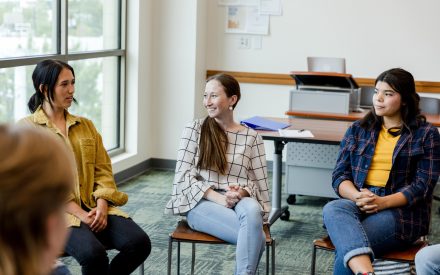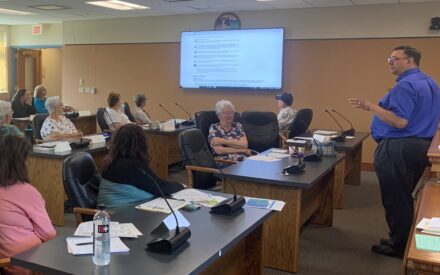One of the goals of Extension’s Health and Well-Being Institute is to improve the health and well-being of communities through education, policy, systems, and environmental approaches by mobilizing collective action. One way to mobilize collective action is to work with local health coalitions, which are groups of community members and organizations that come together to address a specific health issue or set of issues in their communities.
Health and Well-Being Institute professionals play a vital role in health coalitions around the state. By pooling resources and working together, health coalitions are very effective in implementing and sustaining changes that have long-lasting impacts on the health of their communities. The collaborative efforts of these coalitions, often led by Extension professionals, have resulted in increased community partnerships, improved coalition functioning, and healthier people and communities.
Doing More Than Direct Education
When working in connection with coalitions, the goal is to work beyond individual education to create systems and environments that improve community health. For example, Extension educators reported the coalitions they work with made changes to policies and ordinances, man-made environments to better support healthy eating and exercise, public awareness of local health issues via social marketing campaigns, and more.
In Fond du Lac County, an educator provides leadership, coordination, and technical assistance to the Fond du Lac Food Providers Group. This coalition helps local agencies, like food hubs and health departments, direct community members to local and state food resources including FoodShare, WIC, and community food pantries. The Food Providers Group works with Extension to create connections between local emergency food agencies and individuals impacted by food and nutrition security.
Creating Strong Local Partnerships
In 2022, 68 Extension Health and Well-Being Institute professionals worked with 98 health-related coalitions in 53 counties. These coalitions were made up of over 700 unique partnerships between healthcare and hospital systems, health organizations, human services organizations, local health departments, and community members. Over half of the partners involved represent or serve racially and ethnically diverse audiences.
Extension educators in Menominee County/Nation play leadership roles in multiple coalitions that use Indigenous knowledge to plan and advance health- building efforts. The Harvest of the Moon project strengthens Menominee people’s connections to nutritious traditional Menominee foods by combining nutrition education with the Menominee Moons, language, art, and culture. The materials are designed to be used in many settings like schools, community gatherings, 4-H clubs, and senior centers. Each of the 13 monthly posters features the corresponding traditional teachings around the food, the Menominee moon, the name of the food harvested that month in both Menominee and English, traditional recipes, safe harvest and storage tips, and more learning material.
Building Leadership Skills and Capacity to Address Health Inequities
An additional benefit of coalition engagement is the opportunity to build the skills and capacity of local leadership to form high-functioning coalitions and improve local leaders’ abilities to address local health inequities. In Lincoln County, an Extension educator serves on the leadership teams of the local health department, social services department, hospitals, and aging and disability resource center and actively engages youth to make sure the next five-year Community Health Improvement Plan can do and does what the community wants.
Extension Health and Well-Being Institute efforts improve communication among partnering organizations, improve knowledge or resource sharing within and between organizations, and supply better data or access to new data through improved community health assessment processes. By mobilizing collective action, or working together with coalitions, Extension educators build local partnerships within and between coalitions, communities implement best practices and systems-level approaches to community health, and local leaders strengthen their leadership skills and capacity to address local health issues.
Download Article

 Positive Coping Strategies to Reduce Stress
Positive Coping Strategies to Reduce Stress Supporting Adults Who Experience Isolation
Supporting Adults Who Experience Isolation Promoting Adolescent Well-Being
Promoting Adolescent Well-Being Food Entrepreneurship Ecosystem Development, Education, and Evaluation
Food Entrepreneurship Ecosystem Development, Education, and Evaluation


